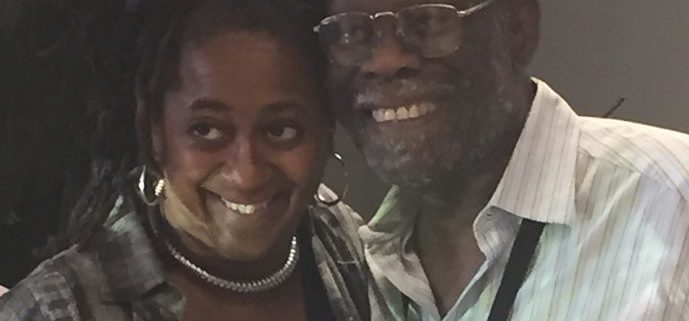Black Community Forum June 16 2016
A Summary Report from the BCRC Forum Secretariat
By Dr. Clarence S. Bayne
24 years after the First Black Community Forum at Val Morin (July 3-5 1992), key Black Community organizations were called together by the Black Community Resource Center (BCRC), at 6767 Cote-des-Neiges. The general purpose of this Community Forum was to review the Val Morin recommendations and priorities, to inform and to invite participation in the development of a community agenda. The BCRC, which acted as the Secretariat of the Community Forum, worked in collaboration with key organizations in the French and English speaking Black communities and ad hoc community committees to develop the agenda and set priorities for the future. The Community Forum thanks the BCRC for staffing the Forum and for providing the materials, space, equipment, and refreshments. It also thanks the Black History Month Round Table for organizing four of the ad hoc community committee meetings and the preparation and distribution of minutes and reports. Thanks also to Yvonne Sam, Fo Niemi of CRARR, Rolf Francois of UNIA, and Dave LaPommeray for their research contributions and for organizing the Rights and Freedoms ad hoc Community meetings.
Different organizations took turns at hosting the meetings of ad hoc community meetings, giving many organizations and individuals the chance to participate in and contribute to the process. Thanks to the Black Youth in Motion, the BCRC staff, DESTA Black Youth Net Work, and the Black Theatre Workshop for hosting those meetings. Finally a great debt is owed to the Black Studies Center (BSC)’s Archive technical staff, in particular Roythan Pink who, with the able assistance of Raeanne Frances and Ashlie Bienvenu (BCRC staff), conducted the technical scripting and operations.
The introductory and opening speakers, Patricia Dillon-Moore and Dr. Clarence S. Bayne, pointed to the fact that the BCRC has historically played a significant role in keeping the Forum mechanism in place and operational since 2000. Minutes in the BCRC Archive, dated April 2004, shows that BCRC has consistently used its resources, and access to resources, to administer and facilitate this process. One example of this process was the hosting of the meetings of ad hoc community meetings, in order to address priority issues and the collective needs of the community. One such significant instance is the City of Montreal Black Task Force chaired by Marcel Tremblay in 2004. BCRC has indicated that it will continue to provide administrative resources and to house the Secretariat of the Community Forum. It has informed the Forum that it is willing, in collaboration with the ad hoc community committees and key organizations, whose missions and mandates address the priorities set by the Form, to call and host meetings of the Community Forum, prepare the agendas, inform the community and organize subsequent community forums.
A Message to the Federal and Provincial Governments from the Forum
For years the Black community organizations have made the case at the Federal and Provincial levels of government, that it is incumbent upon the government to facilitate partnerships between its various Ministries and departments and the appropriate Black community organizations. However, Dr. Bayne, in his welcoming address to the Forum, expressed the view that both the Federal and Provincial governments have abandoned the Black communities in Quebec. This is especially true of the English speaking Black communities, making the members of these communities effectively “constitutionalized field niggers” of the Trudeau “notwithstanding clause” and the collateral consequences of Bill 101. In Session 1 that followed, the Executive Director of QCGN (Sylvia Martin-Laforge ) astutely pointed out that, under the Canadian Constitution, linguistic communities have inalienable rights that are provided for by certain funding agreements. She argued that Blacks in Quebec should cash in on their linguistic rights enjoyed here, as elsewhere in Canada, and from the benefits of Multiculturalism as a state policy. Following on these discussions the following general recommendations from Val Morin 1992 were reaffirmed.
GENERAL RECOMMENDATIONS
A permanent mechanism
The Forum is to be used as a permanent mechanism in the community to ensure that the groups/organizations whose missions and mandates are directed at finding solutions to the priorities established by the Forum, develop strategies and take actions to meet the demands of those priorities. It states, “Community organizations must make efforts to access the range of government resources and services as other communities do on a regular basis.”
Demands for long-term core Funding
A recurring theme in the committee meetings was the administrative instability and discontinuities in the services of organizations, resulting from lack of core funding due to shifts in government policies and biased private and institutional corporate funding. This Forum, like the Val Morin Forum, recommended that the Government of Canada, and the Provincial Government of Quebec, provide sustaining funds for Black organizations with a long-term mandate serving the community and Canadians. It also recommended that, in particular, Heritage Canada, Immigration and Cultural Communities, Library and Archives Canada and other ministries and departments provide long-term recurring funding to mandated Black community based organizations. In addition, it was also suggested that they assist in strengthening Black community based organizations, and facilitate in the creation and transfer of knowledge. This can be accomplished by providing core funding to ensure the implementation and maintenance of professional communications network centers and digitized archival system.
Consensus forming functions of Forum
The current Forum, like the Val Morin Forum, agrees that during a crisis in the Black community, or when decisions are to be made that impact on the entire community (such as decisions relating to toponymy), we will agree to meet to determine the policy goals, to decide how best to inform and involve the wider community in the decisions, and to mandate spokes people to speak on behalf of the community on the issue.
There is general agreement that the Forum be used to create a consensus of opinion and to identify who will speak on behalf of the Black community in times of crisis. For the June 16 Community Forum, the main focus was on rights and freedoms and the seeming failures of the Human Rights Commission; issues of systemic racism; the action taken by key community organizations to deal with the development of the Black child in the triangle of home, school and the community; issues of mental health; culture and identity, and approaches to the management of different cultures and identities in the Black communities. Economic development was not addressed at this Forum.
Black Community Business and Economic Development Summit
The Forum Secretariat felt that, based on the research available, this topic merited a Forum or summit to address it properly and in a productive and creative manner. Thus, the Secretariat proposed that a detailed review be done of the Current Status of Black employment and employability in the Black communities to measure the changes, if any, that have taken place since 1992. To give authority to this decision the Secretariat revisited recommendation 6.2.1.9 of the Val Morin Forum Report which states:
“A FORUM BE HELD TO INFORM AND INVOLVE THE WIDER BLACK COMMUNITY IN ECONOMIC DEVELOPMENT.” This recommendation was, in part, implemented by the McGill Study of the “Evolution of the Black Communities of Montreal” (2001). Professors Bayne and Saade have also published a series of papers on the rise of the business and social entrepreneur in the Black English speaking communities of Montreal, the use of information and communication technologies in community development, and the Yolande James Task Force (2006).
Over the last ten years there has been no formal investigation of the measured impact of the initiatives of all levels of government, private and public institutions, and social and private entrepreneurs in the Black communities on advancing the objective of the Yolande James Task Force: to bring about a full participation of the Black Communities in Québec Society. In particular, special attention needs to be given to the status and future of the English speaking Black communities over the last 25 years.
Black Community Priorities
Based on a review of the minutes of meetings of the ad hoc community meetings, a survey of key organizations conducted by ICED, the Yolande James Task Force Report, published research by Mc Gill Consortium for Ethnicity and Social Planning, and the presentations and discussions at the Community Forum June 16 2016, the following are identified as priorities for our communities :
- Support for the Black Family
- General and Mental Health
- Youth, Education, Employment and Employability
- Arts and Culture
- Rights and Freedom: anti-Racism Strategies
- Economic Development
- Reinforcement of Community Structures and organizations
- A Black Community libraries, archive and communication network system
Structure and authority and functions of the Forum
It has been noted that, while the Forum is not an organization in itself, it is a facilitating mechanism. Thus, the Forum recommendations and the subsequent amendments are priorities/guidelines for us to move on and work on. The responsibility for implementing these policies, therefore, goes to the community organizations. Thus, the role of the Forum will be to provide a meeting place for the community to identify policy issues, to review options, to attempt to develop a consensus whenever possible, and to effectively communicate this consensus. Subject to budget constraints, the Forum Secretariat will be responsible for specific tasks assigned to it by the Forum: the creation of specified sub-committees for dealing with community priorities; making the community, the government ministries and departments aware and informed of the priorities and needs of the communities; monitoring the implementation and encouraging organizations to participate by observing and integrating the recommendations into their practices; determining the date of the next General Black Community Forum.
Recommendation 6.5.1.14 of the Val Morin Forum requires that the Forum (Secretariat) “resolve, in its future consultation with the wider Black community, ensures that a proper and timely system of notification and communication be employed to allow for more meaningful participation from groups. Other groups are encouraged to also share this objective.”
Information gathering and Communication
With respect to the gathering, archiving and communication of information, there is already in place the Black Community Library and Archives project developed by the Black Studies Center in collaboration with the QBBE, the BCRC and ICED. It specializes in processing the archives of the English Speaking Black/Pan African communities. The Forum also agrees that the Black History Month Round Table will be responsible for promoting Pan Black/Pan Afrique identity defining events as defined in the Manifesto of identity events approved by an ad hoc community committee meeting. The Forum requires that this sub-committee be responsive to all groups within the larger Black and Canadian communities for information and knowledge about the pan-Black/pan Afrique peoples and communities.
For full version of Semaji June 2016 Click Here




